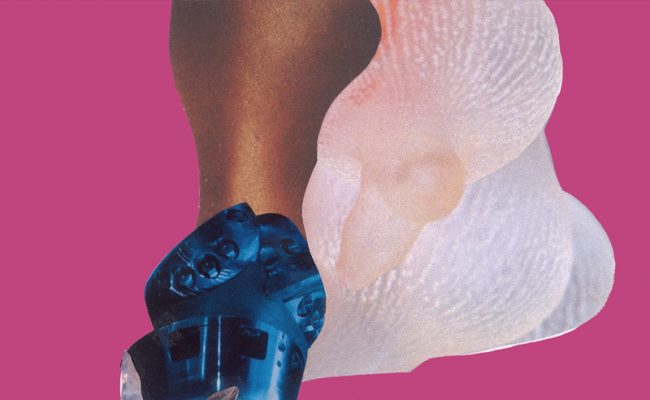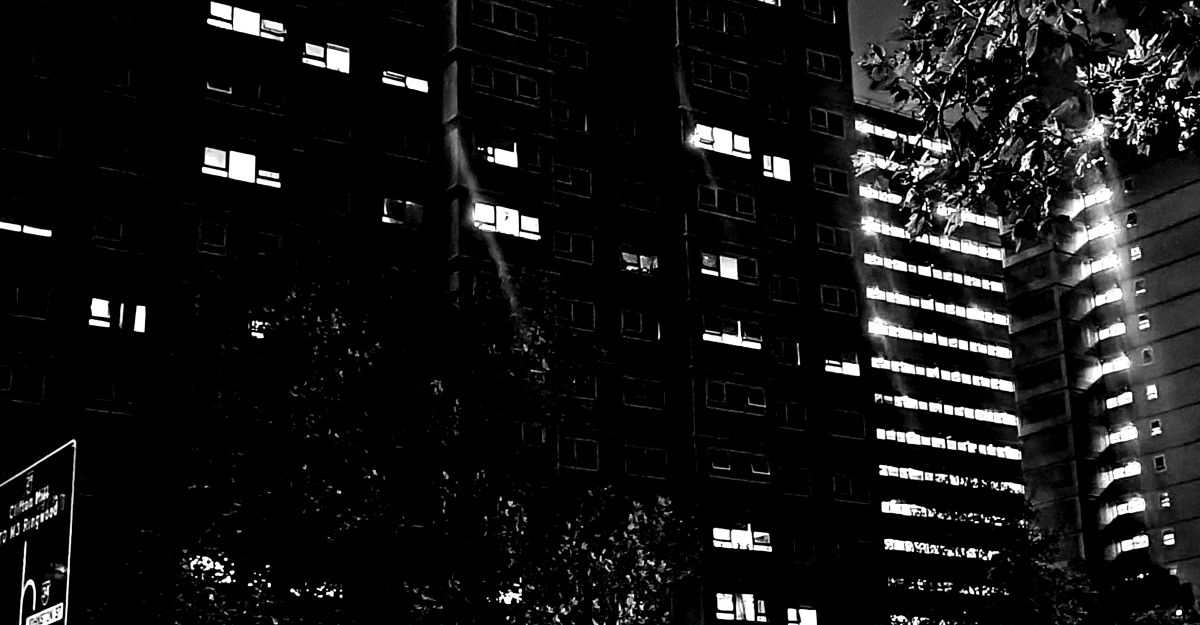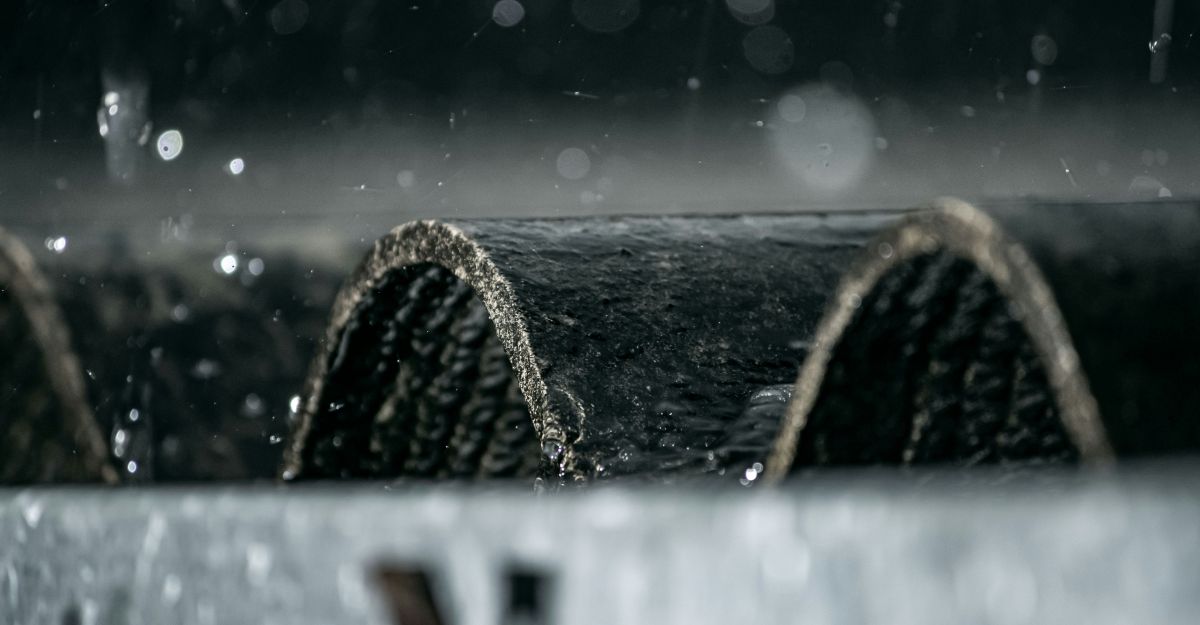Clothes hang from the line, strung out in rows. They are one-dimensional half-people, not quite formed, wilting, limp and lifeless.
Erin watches them absently from the shade of the verandah. The heat of the sun sucks moisture from them just as it drains energy from her. It’s not yet morning smoko and the thermometer sits in the high thirties.
It’s just heat. Nothing is changed by it but the temperature. Drink water, keep hydrated and it’s no different from the cold.
The hot air sits between her skin and her clothes and is taken into her body with each inhalation. She’s empty of everything but burning air. Her crisp casing is eggshell thin.
Just to the south, past the clothesline, a column of red dust rises into the sky. Rob’s ploughing, working the ground in time for the next rain, in time to get a feed crop planted for the cattle. He’ll be looking for her, expecting coffee and biscuits, but the baby has fallen asleep. A night of crying has left him cranky and exhausted. She’s exhausted too but his short nap times are her only chance to get things done. Her life spirals in on itself, reduced to three things: washing, kitchen, baby.
The dog sits beside her, head resting on his paws. Her hand reaches down to scratch the back of his neck. ‘Too hot for you, Quincy, old boy.’
She rises slowly because the air is too hot and too pressing. Inside, she turns on the air conditioner. It begins to disgorge cold air but she’s left it too late. It’ll take time to change the nature of the air and give her some relief. But the heat outside is patient. It waits. It wears her down. It will still be there when she leaves the sanctuary of the house.
Sweat seeps down from her scalp onto her forehead. She wipes it away and looks at the breakfast dishes piled in the sink. The baby hasn’t allowed her time to get them done. She sighs and turns on the tap.
The cry from the nursery is soft at first. Her hands become still in the sudsy water and she turns her head, listening. At times he makes a sound and drops back off to sleep but not today. There’s a quick crescendo, accompanied by moments of silence as he gasps to catch a sobbing breath. She takes one cup, plunges it into the water, goes over it with the dish cloth and puts it onto the rack to drain. She has a moment to regret the five minutes sitting on the verandah and grabs the tea towel on her way past to wipe her hands. By now the baby’s sobs are desperate.
‘I’m coming, baby,’ she calls.
The tractor dominates the landscape. Rob sits in the cabin filled with cold air and loud music. He looks straight ahead. He’s been there since sun-up, caught in a monotonous circling pattern. The thing about tractor driving is the thinking time but Rob’s sick of thinking. He thinks about the cattle and the level of the dams, about the stupidity of planting the crop dry and about his chances of getting a decent crop if he doesn’t take the risk.
He sees evidence of Erin before he sees her. His eyes follow the trail of dust swelling out behind the ute. He watches as she skirts the cultivation and parks beside the four-wheeler. He stops the tractor engine and the silence scars the air.
She’s pulled the picnic blanket out and spreads it on a level part of the dam bank. Alex sits in the middle with sun hat and a Vegemite face. Quincy slumps on the ground, paws inching towards the edge of the blanket.
‘Hey, buddy.’ Rob stretches out beside the baby and tickles his toes. Alex lunges for him and attempts a word that sounds like Daddy. He grabs Rob’s hat and pulls it down over his eyes.
Erin smiles. Rob likes it when she smiles. It makes him forget, for a while, about the heat and the deep blue, cloudless sky.
‘It’s hot,’ she says and he sees the weariness behind her smile. ‘Alex only slept for half an hour.’
He rolls over on his back and lifts the baby up above his head. ‘You have to sleep for mummy, you little rascal.’ He lowers the baby and blows raspberries on his bare belly. The baby giggles and squirms.
The coffee’s hot and the biscuits sweet. He’ll ask her to bring something cold tomorrow.
Erin takes the baby’s hands and helps him walk down to the edge of the water. They make a nice picture, the woman, the baby and the dog with the sun reflecting off the brown surface of the water behind them. The white trunks of gum trees reach high above the dam. Their dull green leaves are sparse and allow the sun to create scattered shadow-patterns on the red dirt. Rob picks up a stone and sends it skipping across the surface of the water. Quincy runs around, barking at the splashes.
‘Better get back to it.’
‘Will you be home for lunch?’
‘Sure. Sooner if it rains.’ He laughs.
She turns to look at him. She’s still getting used to the sarcasm.
A strong breeze blows across the dam, moving the leaves high above, causing the ground-shadows to change. The corner of the picnic rug lifts and knocks over the coffee thermos and tips the biscuits from their container.
Rob looks towards the east. Spiralling into the sky, out past the horizon, a thin grey column is reaching upward. He frowns. ‘Looks like smoke.’
Erin moves up beside him. ‘It’s a long way away.’ Her words are a statement but also a question.
‘Yeah, no problem. Too far away to worry us.’
The baby is irritable. Erin puts him on the floor in the kitchen with plastic containers and a wooden spoon. The washing up has increased with lunch. He tries to walk but falls and hits his head. She cuddles him and walks the hallway, attempting to put him to sleep. His eyes half close then open wide.
She gives in.
She puts on his hat, rubs sunscreen over his chubby arms and legs and takes him out into the yard. They sit in the shade of the pepper tree. She turns on the hose to fill up the wading pool, pulls her chair right up next to it and lets her feet swish in the cool, brown dam water.
uincy barks at the stream of water coming from the end of the hose. She waves it around, just out of his reach. He snaps as if he can catch it. The baby giggles and tries to run after him on legs that have not yet found their rhythm or their strength. Erin laughs with them.
She notices the washing on the line. It flaps wildly, performing acrobatic feats on the Hills Hoist high wire. The wind is strong and hot, a fan-forced oven.
She hasn’t noticed the strength of the wind increase. She looks up at the sky, at the haze that wasn’t there before. With the wind comes the smell of smoke.
She picks up the baby and carries him under her arm to the verandah. He squirms and cries.
The smoke on the eastern horizon has changed from a thin spiral to a billowing grey smudge. She turns her head. No sound. There’s been sound since sun-up. Now the tractor has stopped.
She pushes through the barrier into the airconditioned house and closes the door on the heat. She picks up the phone and dials Rob’s mobile number. No answer. She tries again and goes to the front door to peer through the fly screen.
She sees the red dust that trails behind the four-wheeler.
He pulls up outside the shed, sliding to a standstill. Dust envelopes him as the wind picks it up and tosses it in a cloud across the dry ground.
His phone rings. He pulls it from his pocket and enters the house holding it to his ear. Erin stands aside, the baby on her hip.
‘Okay, mate. Already on my way.’
He doesn’t take his boots off but grabs the ute keys from the hook in the hallway. Erin follows behind.
‘Jimmy Fry’s place is going up.’
‘The fire?’
‘The fire crew’s on its way but they’ll be too late to save the house. Henry’s bringing his water truck and Alan’s already heading over with the dozer. I’ll take the ute and meet them there. You ring Bill and Andrew. We can do with as much help as we can get.’
‘Rob?’
‘Don’t worry.’ He stands still for a minute. ‘Keep an eye on it and if it looks like getting close, take the car and head to Mum’s in town.’ He pauses. ‘It wouldn’t hurt to grab a few things. There are legal papers and the accounts and bank stuff in a box in my office. Pack up the laptop and a few clothes. Not too much.’
He looks at her and hopes for a smile. ‘It’s just a precaution. It’s a hell of a long way away and it’s moving slowly. Just don’t leave it too long.’
She doesn’t say anything. He wants her to. He wants her to tell him to stay and look after her and the baby. He bends down and kisses her.
He kisses the baby. ‘You behave yourself.’ He tickles the little boy on the toes. ‘Look after your mum, hey.’
He’s gone.
She hasn’t had long enough to get used the place, to being alone. He’s spent his whole life getting used to it. She doesn’t know how to solve these problems on her own.
She puts the baby in his cot. He grizzles, crying and calling out to her. She ignores him and concentrates on the things they have and the things they can do without. It takes longer than she expects, this categorising of their possessions.
The house is enclosed, the air conditioner hums and grinds out artificial air. The baby has stopped crying. He’s fallen asleep. She smiles, relieved.
She opens the door to a different world. The wind has whipped up stronger than before and the air is crowded with smoke. She breathes it in with quick gasps. Her heart thumps and she closes the door on the thick air.
Her neat piles become unimportant. She grabs the baby. He wakes and cries but she ignores his struggles to pull free. She runs to the car, straps him into his seat and closes the door.
Quincy.
She calls out to him but her words are dashed away.
She opens the car door and unstraps the baby. He’s crying loudly but instead of fighting, clings to her shoulder. Her fear is contagious.
She runs to the back of the house and stops when she looks towards the east. The whole horizon is alive and red. She can hear the roar of the fire as the wind pushes it forward. The clothes on the line stand out, horizontal to the ground.
‘Quincy.’ She hurries towards the back of the house and he’s there, huddled and shaking, in a corner by the back door. She grabs him by the collar and pulls him behind her. The baby’s fingers claw at her and she hears his muffled cries and feels his tears against her neck.
She has them both in the back seat, the baby strapped in, the dog huddled on the floor. She gets in and turns the key. The engine roars. She reverses out of the shed and turns down the driveway.
Don’t leave it too long, Rob had said. But she has left it too long.
Flames jump from one tree to the next and their tree-lined driveway is a raging tunnel. All around her are flames. She reverses the car and heads back to the house.
She hasn’t lived here long enough. Tears run down her face. She rests her head against the steering wheel and thumps it with her fist.
She hears Quincy whimper and the baby reaches his arms out for her. She sees the flames touch the house. She turns the car around and drives west, out across the paddock, away from the fire.
Rob stops the ute beside the remains of his house. Twists of smoke rise up as if from the surface of a crater. The clothesline stands, dripping charred fabric, a skeletal monument.
He’s afraid to leave the vehicle. He’s afraid of what he’ll find when he steps out.‘She’s not here.’ His mother’s voice, high-pitched on the phone. ‘She didn’t come. Rob?’
He’d hung up. He should have stayed, even though she didn’t ask him to.
He stands beside it, this pile that was his home, and feels the heat. There’s a silence that’s eerily unlike any silence he’s ever experienced. No bird sounds, no rustling of leaves in the wind. A silence that goes right through him.
The ash blows away. His home swirls around him. His life scattered, taken to some other place where it will settle in unfamiliar surroundings.
He hears barking.
Quincy.
He turns. The sound comes from the west, out past the rise that is the bank surrounding the dam. He takes a few steps forward and stops to listen. Into the silence the sound echoes again. He runs across charred ground. Heat rises to meet him, burning through the soles of his boots.
He scrambles over the ridge. The dam is shrunken and almost dry but around the small puddle of water red dirt stretches, empty of any growth, empty of any sign of ash or heat. The car sits beside the dam, front wheels sinking into the mud in the shallows. Beside it, in its shade, they are gathered. Erin and the baby are covered in mud, her hair plastered to her head, her clothes sticking to her body. She tosses handfuls of water into the dam. Quincy snaps at the splashes, jumping and landing in the water. The baby giggles, trying to catch hold of the dog’s fur as he runs past.
When Rob calls out, Erin turns to him. She smiles. It’s not the smile he loves but he sees relief, and something else. He sits beside them at the edge of the water. The baby grabs at his hair, the wife leans her head against his shoulder.
It has never occurred to him before that she’s a stranger here and that she might not love this place as he does.
Read the rest of Overland 240
If you enjoyed this piece, buy the issue
Or subscribe and receive
four brilliant issues for a year




